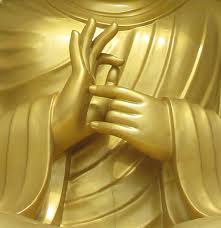Buddhist texts throughout history agree that a teacher is necessary in order to make progress in the Dharma. And they emphasize the need to examine a potential spiritual teacher carefully. This is not only a modern issue. In an excerpt from Khenpo Gyaltsen‘s A Lamp Illuminating the Path to Liberation: An Explanation of Essential Topics for Dharma Students, Khenpo reviews the qualities of a Dharma teacher according to classic Mahāyāna texts. These core guidelines help a student make informed evaluations of a teacher. And this is far safer than relying on fickle emotions or following trends. If an interested student remembers to look for these qualities when examining a teacher, the teacher and student relationship can develop well.
Choosing a Dharma Teacher
Sometimes people believe that choosing a Dharma teacher is a matter of finding someone famous. Perhaps they decide to follow someone who has written a lot of books. Or, maybe friends or colleagues push someone to see a certain teacher. How can new students possibly know who is qualified to teach the Dharma? And how can they begin to evaluate a teacher when there seem to be so many people offering teachings, retreats, or courses? Does one just follow someone who is popular or is there a need for some research? And how does one make smart choices?
The Ten Qualities of a Dharma Teacher
The teacher’s qualities and characteristics are explained in various ways in the different scriptures. In The Ornament of the Great Vehicle Sūtra (Mahāyānasūtrālaṃkāra),1Ornament of the Great Vehicle Sūtras, translated by the Dharmachakra Translation Committee (Snow Lion Publications, 2014), pp. 579-580. it is taught that a dharma teacher must have ten specific qualities:
One should follow a spiritual teacher who is gentle, at peace, thoroughly at peace,
Possesses superior qualities, is diligent, rich in terms of scripture,
Realized with respect to reality, skilled in teaching,
Loving in nature, and has relinquished weariness.As explained therein:
- Endowed with discipline, the teacher is gentle
- Endowed with samadhi, the teacher is at peace;
- Endowed with wisdom, they have thoroughly pacified the afflictions;
- Possessing qualities that surpass all others, they possess superior qualities;
- Free of laziness when it comes to benefiting others, they are diligent;
- Having studied extensively, they are rich in terms of scripture;
- Knowing the true nature as that which is to be known, they are realized with respect to reality;
- They are eloquent and skilled in teaching;
- They are loving in nature and not influenced by concerns for material wealth;
- They have relinquished weariness with regard to teaching the dharma.
These are the ten qualities.
The Way the Teacher Expounds the Dharma
Teachers expound the dharma in a manner that is endowed with the six pāramitās [perfections] as follows:
- Giving to others the words and meaning they have realized themselves is generosity;
- Binding the negative conduct of their three doors of body, speech, and mind is discipline;
- Enduring heat, cold, and other such hardships is patience;
- Taking joy in explaining the dharma is diligence;
- Keeping their own mind in one-pointedness is concentration;
- Examining and explaining the contradictions and connections between words and meaning is wisdom.
In this way they expound the dharma in a manner that is sealed with the six pāramitās.
A Lamp Illuminating the Path to Liberation: An Explanation of Essential Topics for Dharma Students by Khenpo Gyaltsen, pp. 7-9.



